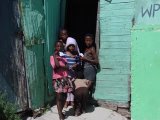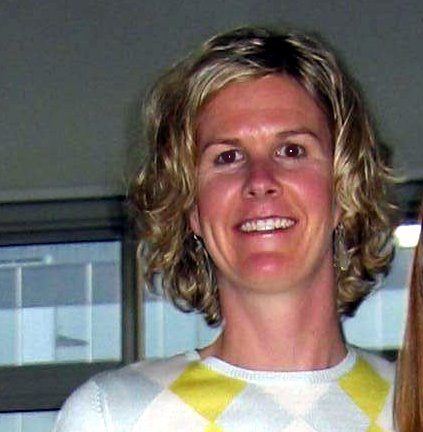Cape Town – The Bad
 You knew it had to be coming…
You knew it had to be coming…In my mind, the poverty and crime in Cape Town puts up a good fight to completely overshadow all that is beautiful about it. We spent half of Tuesday and all day on Wednesday in the car as Yusef drove us around one township after another – townships with names like Lavendar Hills, Mitchell Plains, Pelican Park and, the grand daddy of them all, Khayelitsha. Linda kept saying to just wait, that what we saw in Johannesburg and Gaborone and in the Linda township we visited in Livingstone, Zambia pales in comparison to those of Cape Town. She was right.

First, there is the sheer number and size of them. We drove for hours around these. Stopping at a newly built observatory point in Khayelitsha – which is where the orphanage where I will work in December is located – we could see that the township sprawls for miles in all directions (pictured, looking out over Khayelitsha towards False Bay). Of course, part of this is a legacy of apartheid, but today, part also is due to uncontrolled immigration into South Africa. We were told that 55,000 illegal immigrants cross South Africa’s borders each month looking for jobs that are not there. They all end up in the townships. Linda said that every time she comes back to Cape Town this or that township has grown in size or a new one has sprung up – one would like to think that the problem is in reverse at this point, but that doesn’t seem to be the case.
Second, there is the quality of them. Soweto, outside Johannesburg, is massive, but driving around it, you will see more solid homes, more government built homes, a wider variety of structures, some quite nice – Winnie Mandela and Desmond Tutu live in Soweto. Some people in Cape Town – especially many coloured people – complain that the African National Congress has tended to take care of its own, the large black population located around Johannesburg, before turning to Cape Town and its majority coloured population.
Of course, Soweto has its share of tin shacks, but not to the same extent as in Cape Town. Miles and miles of shacks are piled together, with electricity wires flowing in all directions that will cause fires to destroy entire sections in a matter of minutes. Many of these began as squatter camps. In South Africa, you only need to “squat” onto someone’s property for three weeks and then you are legally allowed to stay there. So, people set up their homes one right on top of the other, and no one will or can do anything about it. Roads end and you can look back into the bowels of some of these camps and see nothing but dirt alleys that twist and turn into what must be hell.
And then, there are the children. Those on the streets we met, to say nothing of those in the orphanages we visited, seemed more sickly, their hair patchy, eyes tended to be somewhat crossed, or blank, their faces expressionless, their skin blotchy. By sheer coincidence, Leigh-Ann and Greg had contacted the orphanage where I will work, called Baphumelele, and we all went to it so they could do a site assessment and consider donating money there. Many of the children there did not look well at all. I will have plenty of time to write more about Baphumelele in December, but suffice it to say that I think spending six weeks working there is going to be difficult.
One of Linda’s friends, Father Gugs, an Anglican priest who has started a primary school, an AIDs orphanage and a myriad other programs in Khayelitsha, took us around the township on Wednesday afternoon. We walked back into the heart of one of these squatter camps where Father Gugs set up a preschool for some of the children there. The area had no running water until recently when a Scandanavian volunteer working with Father Gugs spent about $3000, dug a ditch, and ran a water pipe through this section of the township up to the little “school” building. Now most everyone around the area reaches through the tattered school fence to turn on the tap in order to get their daily supply of water. As was the norm in each school or orphanage we visited, the teacher had the children stand and sing us a song. They did that at Father Gug's little preschool as well – and each one of us, even Greg, had to turn and look away to hide our tears as these children sang us the song, “If you are happy and you know it clap your hands.”
Finally, there is the crime. I know we have crime in the United States, but it doesn’t seem to claim the same number of victims - here, almost everyone - or have the same level of desperation. Sooner or later, everyone seems to get hit by one crime or another and you here story after story about it. There is not a house without bars on the doors and windows. They will rob people at church – three masked men with rifles robbed Linda’s friend, Debbie, and others at a church council meeting a few months back. We met a Dutch Reform minister who says people frequently steal the cars of his church members during Sunday services. They even rob schools and orphanages! Several months ago, a couple of armed men went into the nursery at Baphumelele and demanded the keys to the new van that had just been donated to it. In the middle of the day on Tuesday, someone mugged a man right in front of the security guards outside my hotel. For as beautiful as Cape Town is, it would be very hard to live under these conditions - truly, like living in prison, surrounded by some of the most awful living conditions people should never have to endure.



<< Home